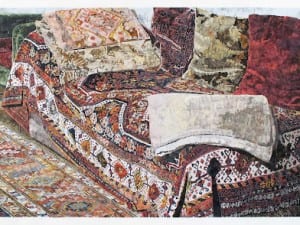A look through the lens: 10 Magnum Photographers’ work goes on display at the Magnum Print Room, which looks at Cuba over the past 50 years.
Since the fall of the US-backed dictatorship of Fulgencio Batista in 1959 and the rise of Castro and the one-party state, Cuba has remained an enigma. Having survived over 40 years of US embargos, put in place to bring down Castro’s government, Cuba has fascinated and enraptured us through its silence, tough exterior and resilience. 1 January 2009 marks the 50th anniversary of the revolution. Located only 145 miles from Florida, USA, Cuba has fascinated people for decades. But, what do we really know about this place?
The latest exhibition to look at this question, and visually offer some answers is Cuba, which opens at the Magnum Print Room this December. Cuba is a vast exhibition whose images tell several stories that span five decades. Curated by Ben Burdett from Atlas Gallery and Sophie Wright, Head of Culture at Magnum, the exhibition looks deep into the many faces and ideas of Cuba throughout the past 50 years. Burdett comments: “We came up with the idea because there are two photographers in particular who were very closely involved with the early revolutionary period. Their work inspires us; we’ve had a solo exhibition for Rene Burri. He’s particularly well known for his photographs of Che Guevara smoking the cigar. Rene’s career, as a photographer, began with a number of heroes that he set out to photograph — Che, Picasso, and many others. Rene was one of the photographers who inspired the idea of doing a group show. The other was Burt Glinn (1925 – 2008) an American photographer. His photographs are immediate and give a real sense of the whole thing happening and unfolding. He was there the moment Castro marched into Havana.”
Included in the exhibition are Eve Arnold’s images from before the revolution, of the unfolding events in 1959 taken by Burt Glinn and Bob Henriques, of life under Castro, both in the early days with portraits of Castro and Che by Rene Burri, Elliott Erwitt and Andrew St George and latterly of the crumbling beauty of Havana by Alex Webb, David Alan Harvey and Christopher Anderson.
Cuba’s allure is ubiquitous, many photographers who have travelled there, continued to return, creating a visual history of a country that has always been on the periphery and often misunderstood. Eve Arnold visited pre-revolutionary Cuba twice in 1954, the first trip to document the life of a young Cuban girl as part of one of Magnum’s first group projects, Children Around the World. She recently returned and photographed her subject, Juana, now a middle-aged woman, for Magnum’s 50th anniversary book and exhibition, Magnum Degrees.
Burt Glinn got the assignment of a lifetime when he flew in to cover Castro’s progress to Havana in 1959 and returned in 2001 to show the President his original images of the revolution. Rene Burri’s portraits of Che Guevara from 1963 are some of the most well known in the world and he has returned to Cuba many times, to see his pictures on t-shirts and hung on Havana’s walls. David Alan Harvey and Alex Webb have produced intensely colourful images of street life over numerous trips starting in the 1990s, Webb in particular, producing some of his most well loved images in the country.
Sent to Havana with a journalist in 1954 for a story called The Sexiest City in the World, Eve Arnold found the city very different from its heyday of ten years before, with a curfew now enforced and Batista’s tanks roaming the city. She still managed to take poignant pictures of what nightlife existed, such as Bar Girl in a Brothel included in the exhibition.
On New Year’s Eve 1958, Burt Glinn was at a party in New York, when he heard the news that Batista was fleeing Cuba. He borrowed money from Cornell Capa and his neighbours before catching what would turn out to be the last flight to Cuba from Miami. Entering Havana, he booked into a hotel near the presidential palace, from where he watched the chaos on the streets. Making contact with other correspondents, including French photographer, Bob Henriques, who was later to become a Magnum Associate, they clubbed together to get a car and drive south from Havana to try to find Fidel. They succeeded and Glinn and Henriques’s images of the victory parade into Havana with its motley crew of guerrillas and supporters are hugely evocative — Castro’s gift for charming his people clearly evident.
Taken in 1963, Rene Burri’s picture of Che Guevara, Castro’s right hand man and Minister of Industry (1961 – 65), has been reproduced both with and without his permission, on everything from t-shirts to Swatch watches. As with Castro, this was a politician conscious of his public image and its power. Burri’s key frame of this charismatic figure shows him leaning back in his office chair, triumphantly smoking a cigar. Che Guevara was assassinated in 1967. Earlier this year, Burri’s retrospective travelled to Havana on a tour of South America, and while there he returned to the office in which he took his famous image, to discover it preserved untouched — a time capsule from a different era.
Magnum’s relationship with Cuba has not always been straightforward. Another associate of the agency who captured the scenes as Castro’s entourage reached the capital in 1959 was Andrew St George. He had previously photographed Castro and his revolutionary army in the Sierra Maestra before the march on Havana. He had amazing access to the rebels, but with time Castro’s men became suspicious. Relations eventually broke down, although St George was to photograph Castro once more on his trip to New York in 1960.
Two of Cuba’s biggest exports, cigars and baseball, reoccur in many of these images. Susan Meiselas, a visitor in the 1970s, photographed children playing baseball in the streets of Havana. Burdett adds: “We started looking at other work by other photographers that had been taken from the moment of the revolution onwards. Some of the most recent are taken by Martin Parr, with his characteristic, kitsch, high colour, gloss images of modern tourism in Cuba with everything else in between. There are a huge number of photographers that have been there, which illustrates the huge fascination that Cuba has had for photographers, there was a fantastic wealth of material to build a show around.”
Two decades later Alex Webb began his long-term love affair with the country, his fluid and intensely coloured compositions include baseball fans, children playing in the street and daily life going on amongst the crumbling splendour. More recently, Christopher Anderson included scenes from Cuba in his personal project, Nonfiction. Using a Holga, Anderson restricted himself to a single shot of each subject, producing imperfect yet evocative images of a cigar smoking local lady, one of Havana’s beautiful old Cadillacs lovingly maintained since the revolution and kids playing in the sea. Burdett comments: “The photographs are incredibly immediate and show how the intensity of the experience produced such great work.”
The branding of the revolution was recorded by Martin Parr in his signature brash, colourful style, whilst on assignment for a French fashion magazine and Paolo Pellegrin, photographing for Newsweek, catches glimpses of the capital while documenting Guatanamo Bay’s post 9/11 high security prison, and its inhabitants, in stark black and white. As Burdett concludes: “Ultimately the images are placed in front of the viewer and the viewer is left to make up their mind, albeit seen through different photographers’ eyes, the images speak for themselves.”
Cuba ran from 2 December until 31 January 2009 at Magnum Print Room, London, EC1V 3RS.
Cherie Federico





